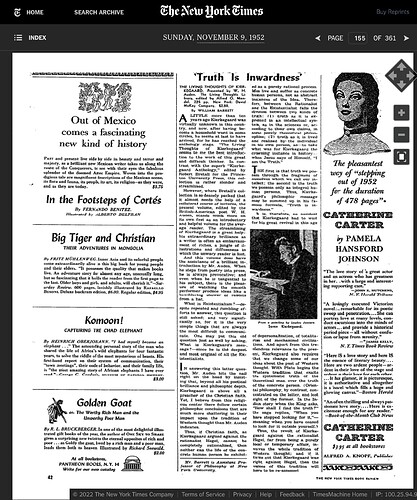It feels like I’m quoting you at random, because the whole paragraph this comes from is rich. As a genuine Menschenkenner (one with insight into people) you understand the problem. Tricky having our human natures involved with spiritual things and ideals.
I recently wrote to a friend that it’s easy, when one belongs to the “main group” in a church to say, “The Gospel is what unites us. We need to focus on the Gospel and Jesus. If we do that, everything else falls into place.”
That sounds fantastic! Let’s do it! But really what is meant is: “you must not be following the Gospel well enough or focused enough on Jesus. You are bringing ____ political beliefs and other baggage that makes it hard to function here. You are the one who seems to be having a hard time in church.” This is exactly the kind of thing Penner has been resisting.
I understand these questions. They’re valuable and based on good observations.
I don’t believe it is too communal. Actually, I would love to find a church that is more so, but in a context where I feel I can really trust the people I’m in communion with to be focused on the Gospel. Where conforming to the Gospel, rather than to the church culture were the focus of the congregation, not just the pastors on Sunday morning. But then we read the news. Or we think of what we’ve seen first hand. And we get to know people with stories like @Klax 's, who might see all of our churches as cults. Don’t know. Can’t speak for him.
Certainly the question of submerging self-identification into group affiliation is huge. The potential for disaster is enormous.
In spite of what I just said above, I am too suspicious to thoroughly submerge my self-identification into group affiliation.
I’ve actually lived this suspicion my entire adult life, not involving myself in “evangelical culture” very much, which would include the organizations, events, consumer culture, political affiliations, “information” sources, school affiliations, music, media, parachurch organizations, and the like. They are off-putting, which no one else seems to understand. And as I look around, I see evidence of them them being as a whole cultural entity very damaging and dis-orienting, or rather re-orienting. Often this reorientation is away from the Gospel and toward money and power or pride.
So, the beggars are still walking.
I think for good reason, too. I am as well. Even as a Bible-carrying member of the group, holding to the foundational beliefs and a brand of resulting doctrines and practices, I’m wary. It makes it harder to participate fully, for sure.
My oldest daughter and I just participated in most of a women’s book group at “the new church” this summer, and we saw a few things that concerned us. Something came up that was quasi-doctrinal, and I (too) sharply disagreed (too) loudly. Women, who would never have questioned anything in public were shocked. (Sorry, ladies. I must work on my delivery.) But a few were looking at me in agreement, and one women echoed what I said from her own experience in much more diplomatic terms and tone.
In spite of my very poor communication style, part of living well communally and “submerging self identification into group affiliation requires” requires that we are carrying out the dialogic work that Penner talks about within the community and that we are willing to allow others to do it as well. Otherwise we do have a cult and tribalism and groupthink.
Well, you know that as a holder of the beliefs, I say “yes, the beliefs balance the risks.” But that’s because I think there is a reality correspondent to the beliefs. Looking from the outside, I’m sure it looks hopeless. As one on the inside, I don’t expect some Golden Age of Christianity or even of the Gospel, and I distrust the claims that there ever were or will be.
I think we see the Gospel operating best in small groups on the fringes, where there is no institutional power and few resources. People don’t have a lot of options besides faith and community, and they need the community to survive, so they may be a bit less picky about their allies. Real Christianity just isn’t showy. Anything that can operate from a position of weakness is not going to look very impressive in the world.
One way or another, as is echoed over in the thread on Universal Salvation, in the end whatever it is, and whoever comprises it, will be made right. We live in that hope through Jesus Christ. And that seems to me to be a great benefit.
We are all so easily distracted. By myriad things. I am. And those distractions are also obstacles to figuring out what we really should be doing with ourselves during our lives or accomplishing any of the goals that could be associated with the Gospel. Your cousin sounds pretty normal, except more honest. At least he is self-aware enough to notice, and honest enough to say it. It’d be better, though, if he could tell the difference between the conservative Christian men’s group and the Gospel.
Some do, and a lot better than I do. Some that do are also stuck in the tribal stuff. It’s had to be completely pure. We’re all short-sighted. So we look to good mentors, who seem to be doing it right. We keep learning and dialoguing.


